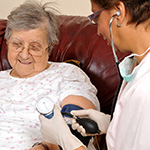Health Care Providers & Holocaust Survivors
The Holocaust was a span of years and an era in history marked by darkness and horror. The mass murder of six million Jews during the Holocaust has become the symbol of atrocity and merciless dehumanization. Today, the sadistic acts that were carried out against the Jews elicit reaction of total disgust, and even disbelief. Because these atrocities have been documented and described in first-person testimonies-both by the Holocaust Survivors and the perpetrators-we know they they did, indeed, take place. Learning of such extremes of torture and humiliation is so difficult to bear, let alone understand, that clinicians might consciously and unconsciously attempt to deny it.
Responses to be Avoided
Superiority–By asking how the Nazis became capable of such cruelty and sadism, it is understandable that clinicians may think that they have nothing in common with such inhuman people. Yet, the Nazi perpetrators were not uncivilized 'barbarians' or criminals. They were, in fact, a lot 'like us.' Many of the elite Nazi leadership figures included highly educated professionals, such as physicians.
Irrelevance—Another way to deal with the difficult reality of the Holocaust is to find reasons to deny the idea that such atrocities could be committed today. Clinicians may try to rationally explain why it is impossible for such inhumanity to reoccur and to conclude that the Holocaust is of no relevance to our contemporary lives, or the future.
Judging—When faced with the victims of atrocities, some clinicians might find reasons to blame the victims. This offers the possibility of preserving a sense of justice, order and
security and to deny the idea of such potential dangers repeating. Clinicians might also direct (consciously and unconsciously) anger at Nazi victims for presenting such a disturbing reality, which can even lead to a desire on the clinicians' part to avoid or reject Survivors.Doubling—Coined by Robert Jay Lifton, it is the process that allowed Nazi doctors in Auschwitz to do the diabolical things they did to the Jews in the concentration camp and
yet continue to view themselves as humane physicians, husbands and fathers outside the Reactions of Health Care Providers to Difficult Behaviors camp. The important conclusion from Lifton's study of Nazi doctors who committed war crimes is that there are situations in which even a person without sociopathic tendencies, and who is not innately evil, can participate in atrocities without experiencing emotional distress.
Download our free Guidebook: Caring for Holocaust Survivors with Sensitivity at the End of Life

This helpful guidebook provides a deeper understanding of end-of-life issues that may manifest in the Holocaust Survivor at the end of life.





